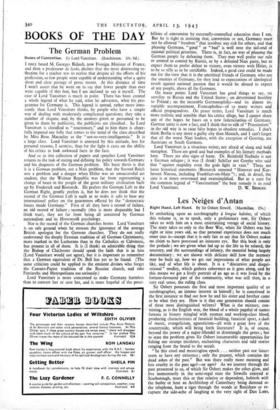BOOKS OF THE DAY
The German Problem
Bones of Contention. By Lord Vansittart. (Hutchinson. 10s. 6d.)
I ONCE heard M. Georges Bidault, now Foreign Minister of France, and then a professeur de lycie, declare that the most distressing re- flection for a teacher was to realise that despite all the efforts of his profession, so few people were capable of understanding what a quite short and clear passage of prose meant. At this distance of time I won't assert that he went on to say that fewer people than ever were capable of this feat, but I am inclined to say it myself. The case of Lord Vansittart is much in point. There has been created a whole legend of what he said, what he advocates, what. his pro- gramme for Germany is. This legend is spread, rather more inno- cently than Lord Vansittart thinks, by people who have a simple way of dealing with moderately complicated questions; they take a number of slogans, and, by the answers given or presumed to be given to them by publicists, the publicists are classified.. So Lord Vansittart is classified as " reactionary," and to him there is cheer- fully imputed any folly that comes to the mind of the class described by Miss Rose Macaulay as the " not-so-very-intelligentsia." It is a large class. Lord Vansittart is annoyed by this attitude, less for personal reasons, I surmise, than for the light it casts on the ability of his critics to look awkward facts in the face.
And so in this collection of papers and, speeches Lord Vansittart returns to the task of stating and defining his policy towards Germany and his diagnosis of the German problem. His basic thesis is that it is a German problem, not a Nazi problem, that the Second Reich was a problem and a danger when Hitler was an unsuccessful art student, that the Weimar Republic was far from representing a change of heart in the people of the great military civilisation built up by Frederick and Bismarck. He prefers the German Left to the German Right, greatly prefers it, but he does not think that the record of the German Left is such as to make it safe to base any international policy on the guarantees offered by the " democratic forces inside Germany." First of all they have a record of failure, an old record of failure ; secondly (this is more disputable but I think true), they are far from being all untainted by German nationalism and its Herrenvolk psychology..
Nor is the record of the German churches better. Lord Vansittart is on safe ground when he stresses the ignorance of the average British apologist for the German churches. They do not really understand the deeply-Erastian tradition of all German Christianity, more marked in the Lutherans than in the Catholics or Calvinists, but present in all of them. It is (I think) an admirable thing that the Bishop of Chichester should speak the faith that is in him (Lord Vansittart would not agree), but it is important to remember' that a German equivalent of Dr. Bell has yet to be found. (The same criticism could be applied to the eminent divines who forget the Caesaro-Papist tradition of the Russian church, and take Patriarchs and Metropolitans too seriously.) Lord Vansittart is more concerned to make Germany harmless than to convert her or save her, and is more hopeful of the possi- bilities- of .conversion by externally-controlled education than I am, But he is right in insisting that, conversion or not, Germany must not be allowed " freedom " that involves any-risk for others, and that pleasing Germans, " good " or •" bad" is well near the tail-end of rational political _priorities. There' is, in fact, no. way of pleasing the German people by defeating them. They may well prefer our rule or control to control by Russia, or by a defeated Naziparty, but to expect them to prefer defeat to victory, even victory with Hitler, is to be so silly as to be certifiable. Indeed, a good case could be made out for the view that it is the uncritical friends of Germany who are the enemies of Germany, for they lead to expectations of ideological revolt against national passion that it would be absurd to expect of any people, above all the Germans.
On many points Lord Vansittart has good things to say, on
servility to Russia and the United States; determined hostility: to Poland ; on the incurable Germanophilia—and its almost in- variable accompaniment, Francophobia—of so many writers and, official propagandists. On peace terms, Lord Vansittart is much more realistic and sensible than his critics allege, but I cannot share any of the hopes he ba,ses on a new federalisation-rof Germany. German unity is now a fact, and I think that to talk of " Prussianism " in the old way is to raise false hopes in obsolete remedies. I don't think Berlin is any more a guilty city than Munich, and I can't forget that all the worst Nazi leaders, with the exception of Goering,. are. Austrians or South Germans.
Lord Vansittart is a vivacious writer, not afraid of slang and bold metaphor. There are good and bad examples _of his literary methods. here. There are also signs of haste. Dr. Reinhold Niebuhr is not a German refugee ; it was (I think) Schiller not Goethe who said that " against stupidity even the gods fight in vain." There are loose historical statements (Bismarck annexed " Hanover and Kat- hessen Nassau, including Frankfurt-on-Main ") ; and, in detail, the case is at times overstated and oversimplified. But as a cure for the common legend of " Vansittartism" the best remedy is to read


























 Previous page
Previous page